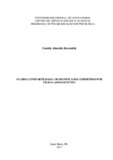| dc.creator | Kostulski, Camila Almeida | |
| dc.date.accessioned | 2018-03-09T13:41:26Z | |
| dc.date.available | 2018-03-09T13:41:26Z | |
| dc.date.issued | 2017-03-06 | |
| dc.identifier.uri | http://repositorio.ufsm.br/handle/1/12661 | |
| dc.description.abstract | Being the joint custody a recent statutory category in the Brazilian judicial system, it has been causing repercussions in family relationships, especially on the practice of parents’ role and on the possibility of new members joining the family. Thereby, sons need to adapt to this category of custody and to the possible difficulties that might be faced daily in these families. Given that, the research that leaded to this thesis proposed as primary objective to comprehend the meanings assigned by teenage daughters to the experiences on joint custody. For that, it was conducted a qualitative research, using multiple case study. The participants were three adolescent girls and their families, which had been clients of the Núcleo de Assistência Judiciária (Legal Assistance Center), where this research took place and that is an entity associated to a Public University located in the south of Brazil. For data collection, it was used a document analysis of the client’s records in the mentioned institution, the fulfilment of a form with both parents and adolescents and a semi-directive interview conducted with the teenage girls. The data analysis was based on the content analysis. The results of this research are presented and discussed in two articles that are part of this thesis. In the first one, the adolescents express satisfaction with the experiences on joint custody, which allows us to considerate this category of custody as an important strategy for the maintenance of parents’ bounds after marital dissolutions. Besides that, the participants pointed out to some difficulties experienced in the relationships with their parents, however, it seems that these difficulties do not interfere in the joint custody. The second article pointed out, based on the teenage girls narratives, that the mothers are still considered the responsible person by their daughters, however, the fathers, in spite of presenting roles usually more driven to family support, kept present in the care of their daughters. It is emphasized the entrance of stepmothers and stepfathers in family relationships in a non-conflictive way, despite the adolescents narratives pointing out to difficulties that parents experience in relating to new members of the family. | eng |
| dc.description.sponsorship | Coordenação de Aperfeiçoamento de Pessoal de Nível Superior - CAPES | por |
| dc.language | por | por |
| dc.publisher | Universidade Federal de Santa Maria | por |
| dc.rights | Attribution-NonCommercial-NoDerivatives 4.0 International | * |
| dc.rights.uri | http://creativecommons.org/licenses/by-nc-nd/4.0/ | * |
| dc.subject | Guarda compartilhada | por |
| dc.subject | Adolescentes | por |
| dc.subject | Parentalidade | por |
| dc.subject | Relações familiares | por |
| dc.subject | Joint custody | eng |
| dc.subject | Adolescents | eng |
| dc.subject | Parenting | eng |
| dc.subject | Family relationships | eng |
| dc.title | Guarda compartilhada: os significados atribuídos por filhas adolescentes | por |
| dc.title.alternative | Joint custody: meanings assigned by teenage daughters | eng |
| dc.type | Dissertação | por |
| dc.description.resumo | A guarda compartilhada por ser uma modalidade recentemente obrigatória no ordenamento jurídico brasileiro vem repercutindo nas relações familiares, especificamente no exercício das funções parentais e na possibilidade da entrada de novos membros na família. Com isso, os filhos precisam se adaptar a essa modalidade de guarda e as possíveis dificuldades enfrentadas no cotidiano das famílias. A partir disso, a pesquisa da qual se origina a presente dissertação teve como objetivo compreender os significados atribuídos por filhas adolescentes sobre as vivências de guarda compartilhada. Com este intuito, realizou-se uma pesquisa qualitativa a partir de um estudo de casos múltiplos. Participaram do estudo três adolescentes e suas famílias, as quais foram incluídas por terem sido clientes do Núcleo de Assistência Judiciária, local onde a pesquisa foi realizada, sendo este um órgão vinculado a uma Instituição Pública de Ensino Superior, do sul do país. Como instrumento de coleta de dados utilizou-se a análise documental nos prontuários dos clientes da instituição referida, o preenchimento de um formulário com os pais e com as adolescentes e uma entrevista semidirigida feita com as adolescentes. A análise dos dados foi realizada segundo a técnica de análise de conteúdo. Os resultados da presente pesquisa são apresentados e discutidos em dois artigos que compõem esta dissertação. No primeiro, as adolescentes evidenciam as vivências de guarda compartilhada como satisfatória, o que permite considerar esta modalidade de guarda como uma importante estratégia para a manutenção dos vínculos parentais após a dissolução conjugal. Como também, as participantes apontaram algumas dificuldades vivenciadas nas relações com seus pais, entretanto, parece que estas não inviabilizam a guarda compartilhada. O segundo artigo, apontou, a partir do relato das adolescentes, que as mães ainda são consideradas as principais responsáveis pelas filhas, entretanto, os pais (homens), apesar de apresentarem funções mais voltadas para o sustento familiar, mantiveram-se presentes nos cuidados com as filhas. Destacou-se ainda, a inserção de madrastas e padrastos nas relações familiares de forma não conflitiva, embora as adolescentes relatem que os pais parecem ter dificuldades de se relacionar com os novos membros da família. | por |
| dc.contributor.advisor1 | Arpini, Dorian Mônica | |
| dc.contributor.advisor1Lattes | http://lattes.cnpq.br/7359875094778140 | por |
| dc.contributor.referee1 | Paraboni, Patrícia | |
| dc.contributor.referee1Lattes | http://lattes.cnpq.br/9699218163384726 | por |
| dc.contributor.referee2 | Mossmann, Clarisse Pereira | |
| dc.contributor.referee2Lattes | http://lattes.cnpq.br/3939132203592588 | por |
| dc.creator.Lattes | http://lattes.cnpq.br/0749811657187929 | por |
| dc.publisher.country | Brasil | por |
| dc.publisher.department | Psicologia | por |
| dc.publisher.initials | UFSM | por |
| dc.publisher.program | Programa de Pós-Graduação em Psicologia | por |
| dc.subject.cnpq | CNPQ::CIENCIAS HUMANAS::PSICOLOGIA | por |
| dc.publisher.unidade | Centro de Ciências Sociais e Humanas | por |



